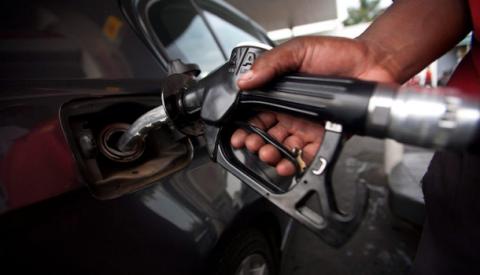
Many Nigerians will wake up this morning to the desolate reality as fuel price yesterday took a major leap, rising from ₦86 per litre to ₦145 per litre.
After the announcement yesterday of an increase in the pump price of Premium Motor Spirit (PMS), otherwise called petrol to ₦145 per liter, the news did not go down well with many Nigerians, as they spent the whole day venting the perceived harsh conditions that will follow.
With the new price, advocates of deregulation – the government’s antidote to perennial scarcity of petrol – have carried the day, even as they are pushing for “full deregulation”.
Marketers are free to import products and sell but not more than ₦145 per litre, the government said.
Before the announcement, petrol sold for ₦86.50 per litre at major filling stations and for ₦86 at Nigerian National Petroleum Corporation (NNPC) stations.
Minister of State for Petroleum Resources Dr. Ibe Kachikwu broke the news at the State House, Abuja.
He said the decision was reached at a meeting presided over by Vice President Yemi Osinbajo. It was attended by the leadership of the Senate, the House of Representatives, the Nigerian Governors Forum (NGF) and Labour unions (the Nigeria Labour Congress (NLC), the Trade Union Congress (TUC), the National Union of Petroleum and Natural Gas Workers (NUPENG) and the Petroleum and Natural Gas Senior Staff Association (PENGASSAN).
The new pump price, Kachikwu said, will ensure increased supply and stabilise the quantity of the product.
Gone now is fuel subsidy, which guzzled billions of dollars in questionable deals.
The meeting also approved all oil marketers to import PMS.
The minister said: “Following a detailed presentation by the honorable minister of state for Petroleum Resources, it has now become obvious that the only option and course of action now open to the government is to take the following decisions:
“In order to increase and stabilise the supply of the product, any Nigerian entity is now free to import the product, subject to existing quality specifications and other guidelines issued by Regulatory Agencies.
“All oil marketers will be allowed to import PMS on the basis of FOREX procured from secondary sources and accordingly PPPRA template will reflect this in the pricing of the product.
“Pursuant to this, PPPRA has informed me that it will be announcing a new price band effective today, 11th May, 2016 and that the new price for PMS will not be above N145 per litre.
“We expect that this new policy will lead to improved supply and competition and eventually drive down pump prices, as we have experienced with diesel.
“In addition, this will also lead to increased product availability and encourage investments in refineries and other parts of the downstream sector. It will also prevent diversion of petroleum products and set a stable environment for the downstream sector in Nigeria.”
Stressing that the government shares the pains of Nigerians, he said the inherited difficulties of the past and the challenges of the current times necessitated the difficult decisions on the critical national issues.
To cushion the current challenges, he said the Federal Government had made an unprecedented social protection provision in the 2016 budget.
Kachikwu also stressed that improved supply and competition will drive down prices in the long term.
According to him, the Department of Petroleum Resources (DPR) and the PPPRA have been mandated to ensure strict regulatory compliance, including dealing decisively with anyone involved in hoarding petroleum products.
Kachikwu noted that the meeting reviewed the current exorbitant prices being paid by Nigerians for the product, which ranged on the average from N150 to N250 per litre in the black market.
The meeting, he said, also noted that the main reason for the current problem is the inability of importers of petroleum products to source foreign exchange at the official rate due to the massive decline of the government’s foreign exchange earnings.
As a result, Kachikwu said, private marketers have been unable to meet their approximate 50% portion of total national supply of PMS.
What are your thoughts on the increase of fuel price from N86.50 per litre to N145 per litre?

